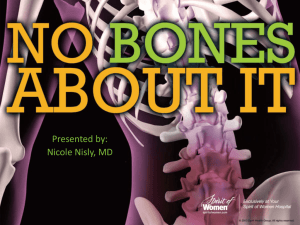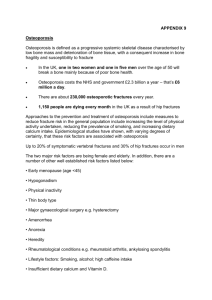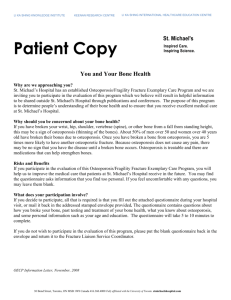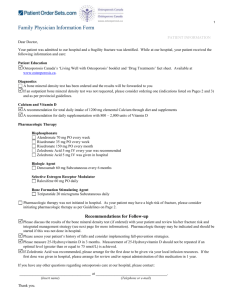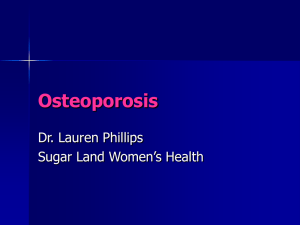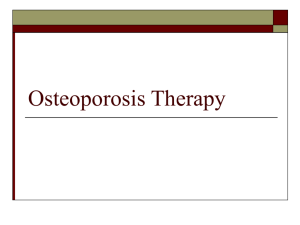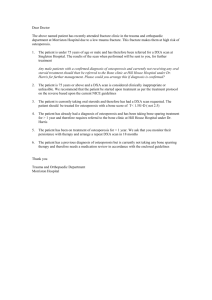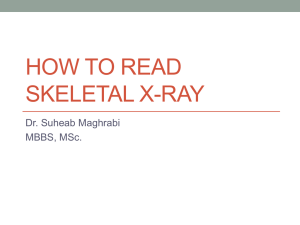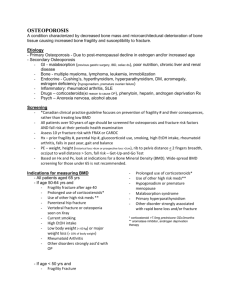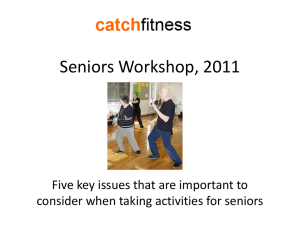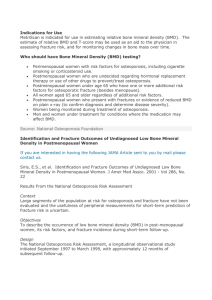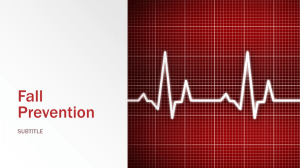What is a fall? - Torbay Care Trust
advertisement
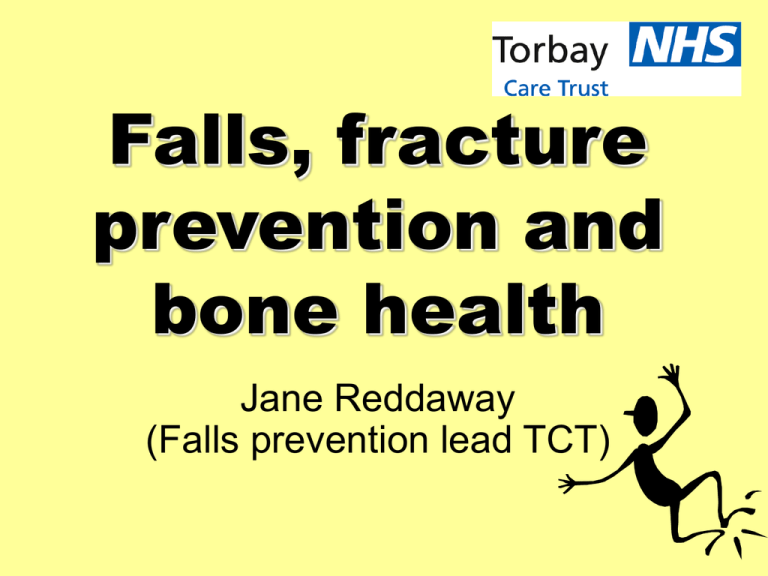
Falls, fracture prevention and bone health Jane Reddaway (Falls prevention lead TCT) Fracture Prevention Osteoporosis To achieve Fracture Reduction Falls Force What is a fall? ‘Unexpected event in which the participant comes to rest on the ground, floor or other lower level than intended’ (Lamb et al 2005) • Includes falling out of bed or a chair, slipping in the bath. • Excludes tripping and correcting self, banging into a wall, being pushed or knocked over, lying on floor intentionally. Falls Guidance • National Service Framework for Older People (2001) • AGS/BGS Guidelines (2010) • NICE Guidance: Falls (2004) • NICE Guidance: Osteoporosis (2004) • RCP National Audit for falls and bone health 2006 • NPSA slips trips and falls in hospital 2007 • WHO global report on falls prevention 2007 • SW Strategic Health Authority ambitions 2009 Categories of Falls • Explained fall: a simple slip or trip • Explained loss of consciousness (LOC): When the diagnosis of LOC is made at the time of the fall or within 7 days. ie MI, CVE. • Unexplained LOC: No cause found even after routine assessment and investigations Unexplained fall / Recurrent falls: no apparent cause or explanation for the fall Identify risk factors: Personal and/or Environmental Can be summarised as: D.A.M.E DRUGS AGEING MEDICAL CONDITIONS ENVIRONMENTAL Drugs: • Side effects/out of date drugs • Poly-pharmacy (more than 4 medications) • Culprit groups: sedatives, diuretics, antihypertensives, hypnotics, antidepressants, and benzodiazepines • Alcohol/recreational drugs • Compliance/over dosing • Alternative therapies Ageing: • Impaired vision • Hearing/vestibular problems • Reduced strength, balance, gait, bone density • Cognitive impairment, dependence • Housing type, living alone, bereavement • Fear of falling/reduced confidence Medical Conditions: • CVE/TIA (stroke), Parkinson’s disease, epilepsy, dementia • Cardiac arrythmias, myocardial infarction (heart attack), chronic heart failure, postural hypotension • Arthritis, osteoporosis • Incontinence, alcoholism • Infection (chest/UTI etc) • Diabetes, hypothyroid • Dehydration Environmental Hazards: • Lighting full spectrum light • Inaccessible lights, bulbs windows, sockets • Stairs • Pets, clutter • Loose carpets, rugs, • Weather slippery floors • Unfamiliar • Ill-fitting footwear environment • Lack of safety • Other people equipment or • Uneven surfaces adaptations in the home. Instant Ageing Interventions that demonstrate good evidence • Exercise programme - Balance, gait and lower limb strength training-either 1:1 or group(A) • Minimise use of Psychoactive medication(B) • Reduce total no. of meds(B) • Expedite cataract surgery (B) • Vit D supplements<800IU/day for proven Vit D deficiency (A) • Home environment interventions (A) AGS/BGS 2010 Osteoporosis Normal bone Osteoporotic bone Osteoporosis literally means “porous bones” What are the risk factors for osteoporosis? • Low trauma fracture. • Oral steroid exposure (any dose for > 3/12). • Hysterectomy or premature menopause < 45 years of age. • Amenorrhoea > 1 year • Family history of hip fracture. • Anti-convulsants • Some medical conditions eg. malabsorption of calcium, hypogonadism. • Low BMI <19kg/m2 • Kyphosis • X ray evidence of vertebral deformity or osteopenia Calcium & Vitamin D Supplementation • 37% of older people in institutional care are vitamin D deficient • High dose calcium and vitamin D prevents hip fracture in institutionalised elderly people by up to 43% • Reduces body sway and improves balance • Available as a sachet dissolved in water Calcichew D3, Caplet; Calfovit, drink once daily, Cacit D3 2 x daily drink or a chewable tablet, Adcal D3 1 tablet twice daily (Ask GP for alternative if non-compliant) • Few side effects – mainly gastrointestinal. Fracture Prevention •Diet •5 a day fruit and veg •1200 mg calcium •800iu Vitamin D •Avoid fizzy drinks, caffeine and excess alcohol •Exercise •Bone loading •Strength training •Site specific (hip/wrist/spine) •Avoid smoking •Plus falls prevention strategies This healthy tortoise had a well balanced, calcium rich diet This tortoise was raised on a high protein, calcium deficient diet. This is a terrible example of poor diet resulting in extreme deformity. Fragility fracture through the life span1 Osteoporosis + falls = fragility fractures Additional morbidity from fragility fractures Morbidity from other causes “Hip fracture is all too often the final destination of a 30 year journey fuelled by decreasing bone strength and increasing falls risk”2 1. J Endocrinol Invest 1999;30:583-588 Kanis JA & Johnell 2. Osteoporosis Review. 2009;17(1):14-16 Mitchell PJ The Falls register Benefits • Identifies those at risk (3/3+) • Informs the GP surgery their patient has had a fall. • Should lead to further assessment if at risk Falls Pathway Complete the Falls register 01803 219700 Including falls risk assessment (FRAT) tool PARIS (IT system for Torbay Care Trust) holds the falls register and will send the details to the GP practice (proforma emails Hdrive/useful resources/forms_templates/falls) The GP practice should ‘Read Code’ the fall: 16D Falls Risk Assessment Tool (FRAT) 1* Ask the person is there a history of any fall in the previous year (include this fall)? Number of falls in previous 12 months = 2 Is the patient/client on four or more medications per day? Identify number of prescribed medications. 3 Does the patient/client have a diagnosis of stroke or Parkinson’s Disease? 4 Does the patient/client report any problems with their balance? 5 Is the patient/client unable to rise from a chair of knee height? Ask the person to stand up from the chair of knee height without using their arms/ask person to describe how they rise from the chair YES *If the answer is YES to question 1 complete falls register 3 or more positive (YES) responses = at risk of falls If scores >3: complete falls register if not already done and carry out a personal and environmental (multifactorial) risk assessment If scores <3 suggest: giving patient information on falls prevention Telephone the falls register to report each fall: 01803 219700 NO What should happen next? If low risk: scores <3 on FRAT : send ‘Staying Steady’ falls prevention leaflet If at risk: scores >3 on FRAT: Should lead to further assessment: Multifactorial falls assessment Falls In Hospital NSPA 2007 identified the following risks as most significant in hospital: • Walking unsteadily • Being confused • Being incontinent/needing the toilet frequently • Previous falls • Taking sedatives Falls the Future Falls, fracture prevention and bone health clinical commissioning group If you would like to join the falls special interest group that meets quarterly email your details to jane.reddaway@nhs.net Useful Contacts • Chris Dixon, Lead Nurse, Osteoporosis. Tel: 01803 655603 chris.dixon2@nhs.net • Jane Reddaway, Lead OT, Osteoporosis/Falls. Tel: 07776 207358 Jane.reddaway@nhs.net Map Of Medicine • The national falls care pathway is available to you on the internet http://www.mapofmedicine.com This outlines the evidence behind falls interventions and what effective interventions can be employed to modify falls risks Resources • NSF for Older People, Standard Six Falls (www.doh.gov.uk) • National Osteoporosis Society (www.nos.org.uk) • Age UK (previously Help the Aged and Age Concern) (www.ageuk.org.uk) • Nice guidelines for Falls (www.nice.org.uk) • Hip protectors: – Promedics 01254 619000 – BSN medical 01482 670100 email: orders.uk@bsnmedical.com – Win Health 01835 864866 Measuring Postural Drop • Lie patient flat for 5 minutes (in silence) then take blood pressure (BP) • Stand patient and repeating BP • Repeat at 3 minutes Orthostatic hypotension- systolic fall more that 20mmHg, diastolic more than 10mmHg Resources • National Patient Safety Agency www.npsa.nhs.uk • Royal College of Physicians National Audit for falls and bone health 2006 www.rcplondon.ac.uk. Leaflets for service users • Torbay Active Ageing leaflet 01803 208840 • What is Postural Hypotension? 01803 219745 • Having Falls? 01803 219745 Exercise Resources Age UK DVDs –’Be Strong, Be Steady’ ‘Step to the Future’ £12 each + p&p www.ageuk.org.uk Thank you Any questions?
